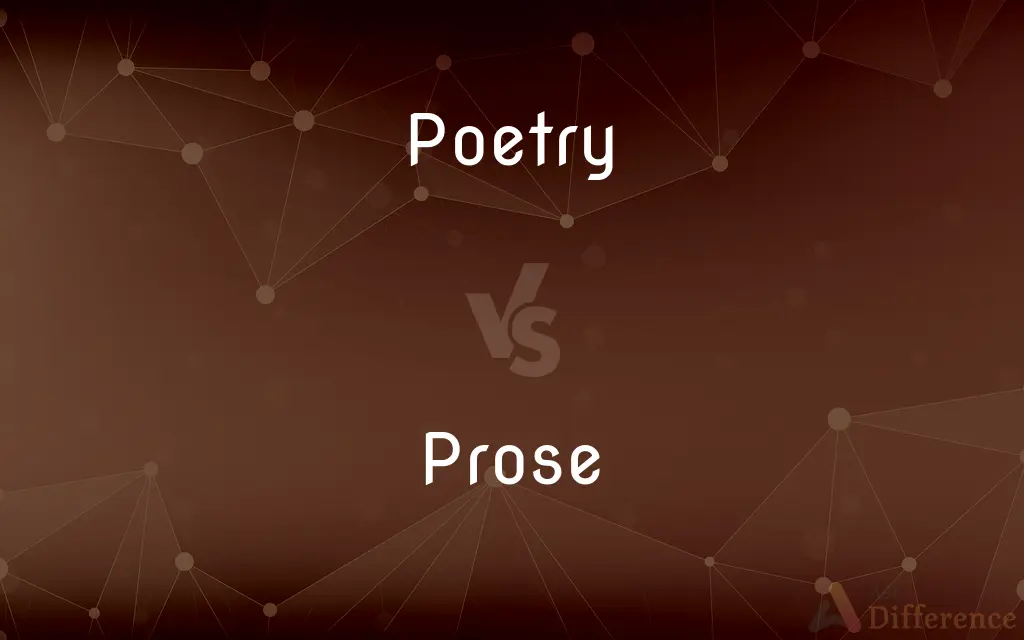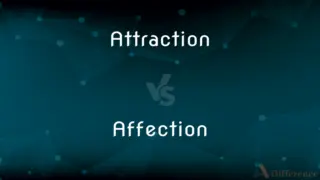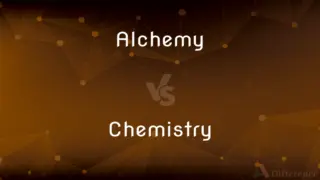Poetry vs. Prose — What's the Difference?
By Tayyaba Rehman — Updated on September 23, 2023
Poetry is a form of artistic expression using structured verse and often rhyme; Prose is natural language, without metrical structure, used in speech and writing.

Difference Between Poetry and Prose
Table of Contents
ADVERTISEMENT
Key Differences
Poetry is an art form that uses structured patterns, rhythms, and often employs rhyme to create aesthetic and emotive effects. Prose, conversely, is the way we commonly speak or write, devoid of specific patterns or rhythm.
While Poetry can be abstract, making ample use of figurative language and symbolism, Prose tends to be more direct and straightforward. Prose encompasses novels, essays, articles, and most written communication outside of the poetic realm.
Poetry frequently evokes strong emotions and imagery, relying on techniques like alliteration, assonance, and meter. In contrast, Prose is more concerned with clarity and directness, focusing on narrative, characters, or arguments.
Each form, Poetry and Prose, has its strengths. Poetry often delves into deep emotional or philosophical subjects, using concise and evocative language. Prose, meanwhile, can expand upon ideas, build intricate worlds, and describe in detail.
Comparison Chart
Structure
Has a specific form or pattern
Lacks specific metrical or rhyming pattern
ADVERTISEMENT
Use
Artistic expression
Common speech and writing
Language
Often uses figurative language and symbolism
Direct and straightforward
Examples
Sonnets, Haikus, Odes
Novels, essays, news articles
Main Purpose
Evoke emotions, convey deep sentiments
Inform, entertain, narrate
Compare with Definitions
Poetry
Artistic expression using condensed language.
Poetry captures vast feelings in limited words.
Prose
Encompasses most non-poetic forms of writing.
From biographies to blog posts, Prose is versatile.
Poetry
A form of writing with a structured verse.
Emily Dickinson's work showcases the beauty of Poetry.
Prose
Lacks the formal structure of poetry.
Essays and articles are examples of Prose.
Poetry
Literary work using rhythm and rhyme.
Poetry can transport readers to different emotional states.
Prose
Written or spoken language without metrical structure.
Novels are usually written in Prose.
Poetry
Evokes imagery and emotions through words.
The Poetry of Maya Angelou resonates with many.
Prose
Ordinary form of spoken or written language.
Daily newspapers use Prose to inform readers.
Poetry
Utilizes techniques like alliteration and assonance.
The power of Poetry lies in its melodic language.
Prose
Prose is a form of written (or spoken) language that usually exhibits a natural flow of speech and grammatical structure—an exception is the narrative device stream of consciousness. The word "prose" first appears in English in the 14th century.
Poetry
Poetry (derived from the Greek poiesis, "making") is a form of literature that uses aesthetic and often rhythmic qualities of language—such as phonaesthetics, sound symbolism, and metre—to evoke meanings in addition to, or in place of, the prosaic ostensible meaning. Poetry has a long and varied history, evolving differentially across the globe.
Prose
Ordinary speech or writing, without metrical structure.
Poetry
The act or practice of composing poems.
Prose
Commonplace expression or quality.
Poetry
Poems regarded as forming a division of literature.
Prose
Roman Catholic Church A hymn of irregular meter sung before the Gospel.
Poetry
The poetic works of a given author, group, nation, or kind.
Prose
To write prose.
Poetry
Literature written in meter; verse.
Prose
To speak or write in a dull, tiresome style.
Poetry
Prose that resembles a poem in some respect, as in vivid imagery or rhythmic sound.
Prose
Language, particularly written language, not intended as poetry.
Though known mostly for her prose, she also produced a small body of excellent poems.
Poetry
The essence or characteristic quality of a poem
"It is impossible to separate the 'poetry' in Paradise Lost from the peculiar doctrines that it enshrines" (T.S. Eliot).
Prose
Language which evinces little imagination or animation; dull and commonplace discourse.
Poetry
A quality that suggests poetry, as in grace, beauty, or harmony
The poetry of the dancer's movements.
Prose
(Roman Catholicism) A hymn with no regular meter, sometimes introduced into the Mass.
Poetry
Literature composed in verse or language exhibiting conscious attention to patterns and rhythm.
Prose
To write or repeat in a dull, tedious, or prosy way.
Poetry
A poet's literary production.
Prose
The ordinary language of men in speaking or writing; language not cast in poetical measure or rhythm; - contradistinguished from verse, or metrical composition.
I speak in prose, and let him rymes make.
Things unattempted yet in prose or rhyme.
I wish our clever young poets would remember my homely definitions of prose and poetry, that is; prose - words in their best order; poetry - the best order.
Poetry
(figurative) An artistic quality that appeals to or evokes the emotions, in any medium; something having such a quality.
That 'Swan Lake' choreography is poetry in motion, fitting the musical poetry of Tchaikovski's divine score well beyond the literary inspiration.
Prose
Hence, language which evinces little imagination or animation; dull and commonplace discourse.
Poetry
The art of apprehending and interpreting ideas by the faculty of imagination; the art of idealizing in thought and in expression.
For poetry is the blossom and the fragrance of all human knowledge, human thoughts, human passions, emotions, language.
Prose
A hymn with no regular meter, sometimes introduced into the Mass. See Sequence.
Poetry
Imaginative language or composition, whether expressed rhythmically or in prose. Specifically: Metrical composition; verse; rhyme; poems collectively; as, heroic poetry; dramatic poetry; lyric or Pindaric poetry.
She taketh most delightIn music, instruments, and poetry.
Prose
Pertaining to, or composed of, prose; not in verse; as, prose composition.
Poetry
Literature in metrical form
Prose
Possessing or exhibiting unpoetical characteristics; plain; dull; prosaic; as, the prose duties of life.
Poetry
Any communication resembling poetry in beauty or the evocation of feeling
Prose
To write in prose.
Prose
To write or repeat in a dull, tedious, or prosy way.
Prose
To write prose.
Prosing or versing, but chiefly this latter.
Prose
Ordinary writing as distinguished from verse
Prose
Matter of fact, commonplace, or dull expression
Prose
Direct and straightforward in expression.
Textbooks often use clear Prose to explain subjects.
Common Curiosities
What is Poetry?
Poetry is an art form that uses structured verse, often with rhyme, to evoke emotion and meaning.
Which form is more common in daily communication?
Prose is more common for daily communication and most written content.
How does Prose differ from Poetry?
Prose is natural language without metrical structure, used in everyday speech and writing.
Why is Poetry often shorter than Prose?
Poetry uses condensed language to convey deep sentiments, while Prose can be more expansive.
Why might someone choose Poetry over Prose?
Poetry can evoke deep emotions and imagery in a concise manner.
Can Prose have a rhythm?
While Prose doesn't have a structured meter like Poetry, it can possess a natural rhythm.
Is all Poetry rhymed?
No, while many poems rhyme, there are forms of Poetry that do not have a rhyme scheme.
Do all Prose pieces lack rhyming?
While Prose typically lacks rhyme, there can be exceptions, especially in artistic writing.
Are novels considered Prose or Poetry?
Novels are considered Prose.
Can Prose be poetic?
Yes, Prose can have poetic qualities, but it lacks the formal structure of Poetry.
Is a haiku an example of Prose?
No, a haiku is a form of Poetry.
Can Prose be emotional?
Yes, Prose can be deeply emotional, though it might convey emotions differently than Poetry.
Why do poets use figurative language?
Figurative language in Poetry helps convey deep meanings, evoke emotions, and create vivid imagery.
What are common elements of Poetry?
Meter, rhyme, alliteration, and figurative language are common in Poetry.
Which form, Poetry or Prose, is older?
Both forms are ancient, but Poetry, as a structured verbal art, likely predates written Prose.
Share Your Discovery

Previous Comparison
Attraction vs. Affection
Next Comparison
Alchemy vs. ChemistryAuthor Spotlight
Written by
Tayyaba RehmanTayyaba Rehman is a distinguished writer, currently serving as a primary contributor to askdifference.com. As a researcher in semantics and etymology, Tayyaba's passion for the complexity of languages and their distinctions has found a perfect home on the platform. Tayyaba delves into the intricacies of language, distinguishing between commonly confused words and phrases, thereby providing clarity for readers worldwide.














































